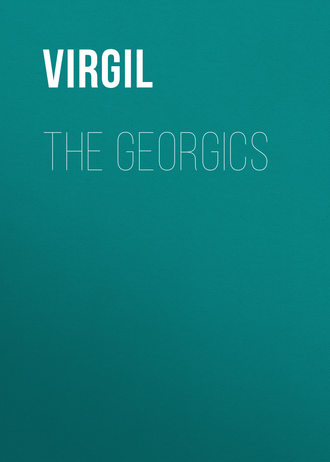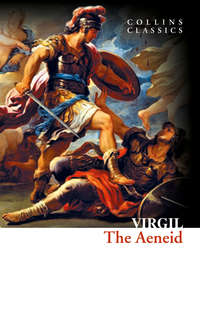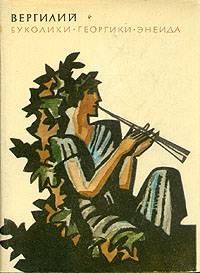The Georgics
 полная версия
полная версияThe Georgics
Жанр: зарубежная поэзиязарубежная классиказарубежная старинная литературастихи и поэзиясерьезное чтениеcтихи, поэзия
Язык: Английский
Год издания: 2018
Добавлена:
Настройки чтения
Размер шрифта
Высота строк
Поля

Virgil
The Georgics
GEORGIC I
What makes the cornfield smile; beneath what starMaecenas, it is meet to turn the sodOr marry elm with vine; how tend the steer;What pains for cattle-keeping, or what proofOf patient trial serves for thrifty bees;-Such are my themes.O universal lightsMost glorious! ye that lead the gliding yearAlong the sky, Liber and Ceres mild,If by your bounty holpen earth once changedChaonian acorn for the plump wheat-ear,And mingled with the grape, your new-found gift,The draughts of Achelous; and ye FaunsTo rustics ever kind, come foot it, FaunsAnd Dryad-maids together; your gifts I sing.And thou, for whose delight the war-horse firstSprang from earth's womb at thy great trident's stroke,Neptune; and haunter of the groves, for whomThree hundred snow-white heifers browse the brakes,The fertile brakes of Ceos; and clothed in power,Thy native forest and Lycean lawns,Pan, shepherd-god, forsaking, as the loveOf thine own Maenalus constrains thee, hearAnd help, O lord of Tegea! And thou, too,Minerva, from whose hand the olive sprung;And boy-discoverer of the curved plough;And, bearing a young cypress root-uptorn,Silvanus, and Gods all and Goddesses,Who make the fields your care, both ye who nurseThe tender unsown increase, and from heavenShed on man's sowing the riches of your rain:And thou, even thou, of whom we know not yetWhat mansion of the skies shall hold thee soon,Whether to watch o'er cities be thy will,Great Caesar, and to take the earth in charge,That so the mighty world may welcome theeLord of her increase, master of her times,Binding thy mother's myrtle round thy brow,Or as the boundless ocean's God thou come,Sole dread of seamen, till far Thule bowBefore thee, and Tethys win thee to her sonWith all her waves for dower; or as a starLend thy fresh beams our lagging months to cheer,Where 'twixt the Maid and those pursuing ClawsA space is opening; see! red Scorpio's selfHis arms draws in, yea, and hath left thee moreThan thy full meed of heaven: be what thou wilt-For neither Tartarus hopes to call thee king,Nor may so dire a lust of sovereigntyE'er light upon thee, howso Greece admireElysium's fields, and Proserpine not heedHer mother's voice entreating to return-Vouchsafe a prosperous voyage, and smile on thisMy bold endeavour, and pitying, even as I,These poor way-wildered swains, at once begin,Grow timely used unto the voice of prayer.In early spring-tide, when the icy dripMelts from the mountains hoar, and Zephyr's breathUnbinds the crumbling clod, even then 'tis time;Press deep your plough behind the groaning ox,And teach the furrow-burnished share to shine.That land the craving farmer's prayer fulfils,Which twice the sunshine, twice the frost has felt;Ay, that's the land whose boundless harvest-cropsBurst, see! the barns.But ere our metal cleaveAn unknown surface, heed we to forelearnThe winds and varying temper of the sky,The lineal tilth and habits of the spot,What every region yields, and what denies.Here blithelier springs the corn, and here the grape,There earth is green with tender growth of treesAnd grass unbidden. See how from Tmolus comesThe saffron's fragrance, ivory from Ind,From Saba's weakling sons their frankincense,Iron from the naked Chalybs, castor rankFrom Pontus, from Epirus the prize-palmsO' the mares of Elis.Such the eternal bondAnd such the laws by Nature's hand imposedOn clime and clime, e'er since the primal dawnWhen old Deucalion on the unpeopled earthCast stones, whence men, a flinty race, were reared.Up then! if fat the soil, let sturdy bullsUpturn it from the year's first opening months,And let the clods lie bare till baked to dustBy the ripe suns of summer; but if the earthLess fruitful just ere Arcturus riseWith shallower trench uptilt it- 'twill suffice;There, lest weeds choke the crop's luxuriance, here,Lest the scant moisture fail the barren sand.Then thou shalt suffer in alternate yearsThe new-reaped fields to rest, and on the plainA crust of sloth to harden; or, when starsAre changed in heaven, there sow the golden grainWhere erst, luxuriant with its quivering pod,Pulse, or the slender vetch-crop, thou hast cleared,And lupin sour, whose brittle stalks arise,A hurtling forest. For the plain is parchedBy flax-crop, parched by oats, by poppies parchedIn Lethe-slumber drenched. Nathless by changeThe travailing earth is lightened, but stint notWith refuse rich to soak the thirsty soil,And shower foul ashes o'er the exhausted fields.Thus by rotation like repose is gained,Nor earth meanwhile uneared and thankless left.Oft, too, 'twill boot to fire the naked fields,And the light stubble burn with crackling flames;Whether that earth therefrom some hidden strengthAnd fattening food derives, or that the fireBakes every blemish out, and sweats awayEach useless humour, or that the heat unlocksNew passages and secret pores, wherebyTheir life-juice to the tender blades may win;Or that it hardens more and helps to bindThe gaping veins, lest penetrating showers,Or fierce sun's ravening might, or searching blastOf the keen north should sear them. Well, I wot,He serves the fields who with his harrow breaksThe sluggish clods, and hurdles osier-twinedHales o'er them; from the far Olympian heightHim golden Ceres not in vain regards;And he, who having ploughed the fallow plainAnd heaved its furrowy ridges, turns once moreCross-wise his shattering share, with stroke on strokeThe earth assails, and makes the field his thrall.Pray for wet summers and for winters fine,Ye husbandmen; in winter's dust the cropsExceedingly rejoice, the field hath joy;No tilth makes Mysia lift her head so high,Nor Gargarus his own harvests so admire.Why tell of him, who, having launched his seed,Sets on for close encounter, and rakes smoothThe dry dust hillocks, then on the tender cornLets in the flood, whose waters follow fain;And when the parched field quivers, and all the bladesAre dying, from the brow of its hill-bed,See! see! he lures the runnel; down it falls,Waking hoarse murmurs o'er the polished stones,And with its bubblings slakes the thirsty fields?Or why of him, who lest the heavy earsO'erweigh the stalk, while yet in tender bladeFeeds down the crop's luxuriance, when its growthFirst tops the furrows? Why of him who drainsThe marsh-land's gathered ooze through soaking sand,Chiefly what time in treacherous moons a streamGoes out in spate, and with its coat of slimeHolds all the country, whence the hollow dykesSweat steaming vapour?But no whit the moreFor all expedients tried and travail borneBy man and beast in turning oft the soil,Do greedy goose and Strymon-haunting cranesAnd succory's bitter fibres cease to harm,Or shade not injure. The great Sire himselfNo easy road to husbandry assigned,And first was he by human skill to rouseThe slumbering glebe, whetting the minds of menWith care on care, nor suffering realm of hisIn drowsy sloth to stagnate. Before JoveFields knew no taming hand of husbandmen;To mark the plain or mete with boundary-line-Even this was impious; for the common stockThey gathered, and the earth of her own willAll things more freely, no man bidding, bore.He to black serpents gave their venom-bane,And bade the wolf go prowl, and ocean toss;Shook from the leaves their honey, put fire away,And curbed the random rivers running wine,That use by gradual dint of thought on thoughtMight forge the various arts, with furrow's helpThe corn-blade win, and strike out hidden fireFrom the flint's heart. Then first the streams were wareOf hollowed alder-hulls: the sailor thenTheir names and numbers gave to star and star,Pleiads and Hyads, and Lycaon's childBright Arctos; how with nooses then was foundTo catch wild beasts, and cozen them with lime,And hem with hounds the mighty forest-glades.Soon one with hand-net scourges the broad stream,Probing its depths, one drags his dripping toilsAlong the main; then iron's unbending might,And shrieking saw-blade,– for the men of oldWith wedges wont to cleave the splintering log;-Then divers arts arose; toil conquered all,Remorseless toil, and poverty's shrewd pushIn times of hardship. Ceres was the firstSet mortals on with tools to turn the sod,When now the awful groves 'gan fail to bearAcorns and arbutes, and her wonted foodDodona gave no more. Soon, too, the cornGat sorrow's increase, that an evil blightAte up the stalks, and thistle reared his spinesAn idler in the fields; the crops die down;Upsprings instead a shaggy growth of burrsAnd caltrops; and amid the corn-fields trimUnfruitful darnel and wild oats have sway.Wherefore, unless thou shalt with ceaseless rakeThe weeds pursue, with shouting scare the birds,Prune with thy hook the dark field's matted shade,Pray down the showers, all vainly thou shalt eye,Alack! thy neighbour's heaped-up harvest-mow,And in the greenwood from a shaken oakSeek solace for thine hunger.Now to tellThe sturdy rustics' weapons, what they are,Without which, neither can be sown nor rearedThe fruits of harvest; first the bent plough's shareAnd heavy timber, and slow-lumbering wainsOf the Eleusinian mother, threshing-sleighsAnd drags, and harrows with their crushing weight;Then the cheap wicker-ware of Celeus old,Hurdles of arbute, and thy mystic fan,Iacchus; which, full tale, long ere the timeThou must with heed lay by, if thee awaitNot all unearned the country's crown divine.While yet within the woods, the elm is tamedAnd bowed with mighty force to form the stock,And take the plough's curved shape, then nigh the rootA pole eight feet projecting, earth-boards twain,And share-beam with its double back they fix.For yoke is early hewn a linden light,And a tall beech for handle, from behindTo turn the car at lowest: then o'er the hearthThe wood they hang till the smoke knows it well.Many the precepts of the men of oldI can recount thee, so thou start not back,And such slight cares to learn not weary thee.And this among the first: thy threshing-floorWith ponderous roller must be levelled smooth,And wrought by hand, and fixed with binding chalk,Lest weeds arise, or dust a passage winSplitting the surface, then a thousand plaguesMake sport of it: oft builds the tiny mouseHer home, and plants her granary, underground,Or burrow for their bed the purblind moles,Or toad is found in hollows, and all the swarmOf earth's unsightly creatures; or a hugeCorn-heap the weevil plunders, and the ant,Fearful of coming age and penury.Mark too, what time the walnut in the woodsWith ample bloom shall clothe her, and bow downHer odorous branches, if the fruit prevail,Like store of grain will follow, and there shall comeA mighty winnowing-time with mighty heat;But if the shade with wealth of leaves abound,Vainly your threshing-floor will bruise the stalksRich but in chaff. Many myself have seenSteep, as they sow, their pulse-seeds, drenching themWith nitre and black oil-lees, that the fruitMight swell within the treacherous pods, and theyMake speed to boil at howso small a fire.Yet, culled with caution, proved with patient toil,These have I seen degenerate, did not manPut forth his hand with power, and year by yearChoose out the largest. So, by fate impelled,Speed all things to the worse, and backward borneGlide from us; even as who with struggling oarsUp stream scarce pulls a shallop, if he chanceHis arms to slacken, lo! with headlong forceThe current sweeps him down the hurrying tide.Us too behoves Arcturus' sign observe,And the Kids' seasons and the shining Snake,No less than those who o'er the windy mainBorne homeward tempt the Pontic, and the jawsOf oyster-rife Abydos. When the ScalesNow poising fair the hours of sleep and dayGive half the world to sunshine, half to shade,Then urge your bulls, my masters; sow the plainEven to the verge of tameless winter's showersWith barley: then, too, time it is to hideYour flax in earth, and poppy, Ceres' joy,Aye, more than time to bend above the plough,While earth, yet dry, forbids not, and the cloudsAre buoyant. With the spring comes bean-sowing;Thee, too, Lucerne, the crumbling furrows thenReceive, and millet's annual care returns,What time the white bull with his gilded hornsOpens the year, before whose threatening front,Routed the dog-star sinks. But if it beFor wheaten harvest and the hardy spelt,Thou tax the soil, to corn-ears wholly given,Let Atlas' daughters hide them in the dawn,The Cretan star, a crown of fire, depart,Or e'er the furrow's claim of seed thou quit,Or haste thee to entrust the whole year's hopeTo earth that would not. Many have begunEre Maia's star be setting; these, I trow,Their looked-for harvest fools with empty ears.But if the vetch and common kidney-beanThou'rt fain to sow, nor scorn to make thy carePelusiac lentil, no uncertain signBootes' fall will send thee; then begin,Pursue thy sowing till half the frosts be done.Therefore it is the golden sun, his courseInto fixed parts dividing, rules his wayThrough the twelve constellations of the world.Five zones the heavens contain; whereof is oneAye red with flashing sunlight, fervent ayeFrom fire; on either side to left and rightAre traced the utmost twain, stiff with blue ice,And black with scowling storm-clouds, and betwixtThese and the midmost, other twain there lie,By the Gods' grace to heart-sick mortals given,And a path cleft between them, where might wheelOn sloping plane the system of the Signs.And as toward Scythia and Rhipaean heightsThe world mounts upward, likewise sinks it downToward Libya and the south, this pole of oursStill towering high, that other, 'neath their feet,By dark Styx frowned on, and the abysmal shades.Here glides the huge Snake forth with sinuous coils'Twixt the two Bears and round them river-wise-The Bears that fear 'neath Ocean's brim to dip.There either, say they, reigns the eternal hushOf night that knows no seasons, her black pallThick-mantling fold on fold; or thitherwardFrom us returning Dawn brings back the day;And when the first breath of his panting steedsOn us the Orient flings, that hour with themRed Vesper 'gins to trim his his 'lated fires.Hence under doubtful skies forebode we canThe coming tempests, hence both harvest-dayAnd seed-time, when to smite the treacherous mainWith driving oars, when launch the fair-rigged fleet,Or in ripe hour to fell the forest-pine.Hence, too, not idly do we watch the stars-Their rising and their setting-and the year,Four varying seasons to one law conformed.If chilly showers e'er shut the farmer's door,Much that had soon with sunshine cried for haste,He may forestall; the ploughman batters keenHis blunted share's hard tooth, scoops from a treeHis troughs, or on the cattle stamps a brand,Or numbers on the corn-heaps; some make sharpThe stakes and two-pronged forks, and willow-bandsAmerian for the bending vine prepare.Now let the pliant basket plaited beOf bramble-twigs; now set your corn to parchBefore the fire; now bruise it with the stone.Nay even on holy days some tasks to plyIs right and lawful: this no ban forbids,To turn the runnel's course, fence corn-fields in,Make springes for the birds, burn up the briars,And plunge in wholesome stream the bleating flock.Oft too with oil or apples plenty-cheapThe creeping ass's ribs his driver packs,And home from town returning brings insteadA dented mill-stone or black lump of pitch.The moon herself in various rank assignsThe days for labour lucky: fly the fifth;Then sprang pale Orcus and the Eumenides;Earth then in awful labour brought to lightCoeus, Iapetus, and Typhoeus fell,And those sworn brethren banded to break downThe gates of heaven; thrice, sooth to say, they stroveOssa on Pelion's top to heave and heap,Aye, and on Ossa to up-roll amainLeafy Olympus; thrice with thunderboltTheir mountain-stair the Sire asunder smote.Seventh after tenth is lucky both to setThe vine in earth, and take and tame the steer,And fix the leashes to the warp; the ninthTo runagates is kinder, cross to thieves.Many the tasks that lightlier lend themselvesIn chilly night, or when the sun is young,And Dawn bedews the world. By night 'tis bestTo reap light stubble, and parched fields by night;For nights the suppling moisture never fails.And one will sit the long late watches outBy winter fire-light, shaping with keen bladeThe torches to a point; his wife the while,Her tedious labour soothing with a song,Speeds the shrill comb along the warp, or elseWith Vulcan's aid boils the sweet must-juice down,And skims with leaves the quivering cauldron's wave.But ruddy Ceres in mid heat is mown,And in mid heat the parched ears are bruisedUpon the floor; to plough strip, strip to sow;Winter's the lazy time for husbandmen.In the cold season farmers wont to tasteThe increase of their toil, and yield themselvesTo mutual interchange of festal cheer.Boon winter bids them, and unbinds their cares,As laden keels, when now the port they touch,And happy sailors crown the sterns with flowers.Nathless then also time it is to stripAcorns from oaks, and berries from the bay,Olives, and bleeding myrtles, then to setSnares for the crane, and meshes for the stag,And hunt the long-eared hares, then pierce the doeWith whirl of hempen-thonged Balearic sling,While snow lies deep, and streams are drifting ice.What need to tell of autumn's storms and stars,And wherefore men must watch, when now the dayGrows shorter, and more soft the summer's heat?When Spring the rain-bringer comes rushing down,Or when the beards of harvest on the plainBristle already, and the milky cornOn its green stalk is swelling? Many a time,When now the farmer to his yellow fieldsThe reaping-hind came bringing, even in actTo lop the brittle barley stems, have ISeen all the windy legions clash in warTogether, as to rend up far and wideThe heavy corn-crop from its lowest roots,And toss it skyward: so might winter's flaw,Dark-eddying, whirl light stalks and flying straws.Oft too comes looming vast along the skyA march of waters; mustering from above,The clouds roll up the tempest, heaped and grimWith angry showers: down falls the height of heaven,And with a great rain floods the smiling crops,The oxen's labour: now the dikes fill fast,And the void river-beds swell thunderously,And all the panting firths of Ocean boil.The Sire himself in midnight of the cloudsWields with red hand the levin; through all her bulkEarth at the hurly quakes; the beasts are fled,And mortal hearts of every kindred sunkIn cowering terror; he with flaming brandAthos, or Rhodope, or Ceraunian cragsPrecipitates: then doubly raves the SouthWith shower on blinding shower, and woods and coastsWail fitfully beneath the mighty blast.This fearing, mark the months and Signs of heaven,Whither retires him Saturn's icy star,And through what heavenly cycles wanderethThe glowing orb Cyllenian. Before allWorship the Gods, and to great Ceres payHer yearly dues upon the happy swardWith sacrifice, anigh the utmost endOf winter, and when Spring begins to smile.Then lambs are fat, and wines are mellowest then;Then sleep is sweet, and dark the shadows fallUpon the mountains. Let your rustic youthTo Ceres do obeisance, one and all;And for her pleasure thou mix honeycombsWith milk and the ripe wine-god; thrice for luckAround the young corn let the victim go,And all the choir, a joyful company,Attend it, and with shouts bid Ceres comeTo be their house-mate; and let no man darePut sickle to the ripened ears until,With woven oak his temples chapleted,He foot the rugged dance and chant the lay.Aye, and that these things we might win to knowBy certain tokens, heats, and showers, and windsThat bring the frost, the Sire of all himselfOrdained what warnings in her monthly roundThe moon should give, what bodes the south wind's fall,What oft-repeated sights the herdsman seeingShould keep his cattle closer to their stalls.No sooner are the winds at point to rise,Than either Ocean's firths begin to tossAnd swell, and a dry crackling sound is heardUpon the heights, or one loud ferment boomsThe beach afar, and through the forest goesA murmur multitudinous. By thisScarce can the billow spare the curved keels,When swift the sea-gulls from the middle mainCome winging, and their shrieks are shoreward borne,When ocean-loving cormorants on dry landBesport them, and the hern, her marshy hauntsForsaking, mounts above the soaring cloud.Oft, too, when wind is toward, the stars thou'lt seeFrom heaven shoot headlong, and through murky nightLong trails of fire white-glistening in their wake,Or light chaff flit in air with fallen leaves,Or feathers on the wave-top float and play.But when from regions of the furious NorthIt lightens, and when thunder fills the hallsOf Eurus and of Zephyr, all the fieldsWith brimming dikes are flooded, and at seaNo mariner but furls his dripping sails.Never at unawares did shower annoy:Or, as it rises, the high-soaring cranesFlee to the vales before it, with faceUpturned to heaven, the heifer snuffs the galeThrough gaping nostrils, or about the meresShrill-twittering flits the swallow, and the frogsCrouch in the mud and chant their dirge of old.Oft, too, the ant from out her inmost cells,Fretting the narrow path, her eggs conveys;Or the huge bow sucks moisture; or a hostOf rooks from food returning in long lineClamour with jostling wings. Now mayst thou seeThe various ocean-fowl and those that pryRound Asian meads within thy fresher-pools,Cayster, as in eager rivalry,About their shoulders dash the plenteous spray,Now duck their head beneath the wave, now runInto the billows, for sheer idle joyOf their mad bathing-revel. Then the crowWith full voice, good-for-naught, inviting rain,Stalks on the dry sand mateless and alone.Nor e'en the maids, that card their nightly task,Know not the storm-sign, when in blazing crockThey see the lamp-oil sputtering with a growthOf mouldy snuff-clots.So too, after rain,Sunshine and open skies thou mayst forecast,And learn by tokens sure, for then nor dimmedAppear the stars' keen edges, nor the moonAs borrowing of her brother's beams to rise,Nor fleecy films to float along the sky.Not to the sun's warmth then upon the shoreDo halcyons dear to Thetis ope their wings,Nor filthy swine take thought to toss on highWith scattering snout the straw-wisps. But the cloudsSeek more the vales, and rest upon the plain,And from the roof-top the night-owl for naughtWatching the sunset plies her 'lated song.Distinct in clearest air is Nisus seenTowering, and Scylla for the purple lockPays dear; for whereso, as she flies, her wingsThe light air winnow, lo! fierce, implacable,Nisus with mighty whirr through heaven pursues;Where Nisus heavenward soareth, there her wingsClutch as she flies, the light air winnowing still.Soft then the voice of rooks from indrawn throatThrice, four times, o'er repeated, and full oftOn their high cradles, by some hidden joyGladdened beyond their wont, in bustling throngsAmong the leaves they riot; so sweet it is,When showers are spent, their own loved nests againAnd tender brood to visit. Not, I deem,That heaven some native wit to these assigned,Or fate a larger prescience, but that whenThe storm and shifting moisture of the airHave changed their courses, and the sky-god now,Wet with the south-wind, thickens what was rare,And what was gross releases, then, too, changeTheir spirits' fleeting phases, and their breastsFeel other motions now, than when the windWas driving up the cloud-rack. Hence proceedsThat blending of the feathered choirs afield,The cattle's exultation, and the rooks'Deep-throated triumph.But if the headlong sunAnd moons in order following thou regard,Ne'er will to-morrow's hour deceive thee, ne'erWilt thou be caught by guile of cloudless night.When first the moon recalls her rallying fires,If dark the air clipped by her crescent dim,For folks afield and on the open seaA mighty rain is brewing; but if her faceWith maiden blush she mantle, 'twill be wind,For wind turns Phoebe still to ruddier gold.But if at her fourth rising, for 'tis thatGives surest counsel, clear she ride thro' heavenWith horns unblunted, then shall that whole day,And to the month's end those that spring from it,Rainless and windless be, while safe ashoreShall sailors pay their vows to Panope,Glaucus, and Melicertes, Ino's child.The sun too, both at rising, and when soonHe dives beneath the waves, shall yield thee signs;For signs, none trustier, travel with the sun,Both those which in their course with dawn he brings,And those at star-rise. When his springing orbWith spots he pranketh, muffled in a cloud,And shrinks mid-circle, then of showers beware;For then the South comes driving from the deep,To trees and crops and cattle bringing bane.Or when at day-break through dark clouds his raysBurst and are scattered, or when rising paleAurora quits Tithonus' saffron bed,But sorry shelter then, alack I will yieldVine-leaf to ripening grapes; so thick a hailIn spiky showers spins rattling on the roof.And this yet more 'twill boot thee bear in mind,When now, his course upon Olympus run,He draws to his decline: for oft we seeUpon the sun's own face strange colours stray;Dark tells of rain, of east winds fiery-red;If spots with ruddy fire begin to mix,Then all the heavens convulsed in wrath thou'lt see-Storm-clouds and wind together. Me that nightLet no man bid fare forth upon the deep,Nor rend the rope from shore. But if, when bothHe brings again and hides the day's return,Clear-orbed he shineth, idly wilt thou dreadThe storm-clouds, and beneath the lustral NorthSee the woods waving. What late eve in fineBears in her bosom, whence the wind that bringsFair-weather-clouds, or what the rain SouthIs meditating, tokens of all theseThe sun will give thee. Who dare charge the sunWith leasing? He it is who warneth oftOf hidden broils at hand and treachery,And secret swelling of the waves of war.He too it was, when Caesar's light was quenched,For Rome had pity, when his bright head he veiledIn iron-hued darkness, till a godless ageTrembled for night eternal; at that timeHowbeit earth also, and the ocean-plains,And dogs obscene, and birds of evil bodeGave tokens. Yea, how often have we seenEtna, her furnace-walls asunder riven,In billowy floods boil o'er the Cyclops' fields,And roll down globes of fire and molten rocks!A clash of arms through all the heaven was heardBy Germany; strange heavings shook the Alps.Yea, and by many through the breathless grovesA voice was heard with power, and wondrous-palePhantoms were seen upon the dusk of night,And cattle spake, portentous! streams stand still,And the earth yawns asunder, ivory weepsFor sorrow in the shrines, and bronzes sweat.Up-twirling forests with his eddying tide,Madly he bears them down, that lord of floods,Eridanus, till through all the plain are sweptBeasts and their stalls together. At that timeIn gloomy entrails ceased not to appearDark-threatening fibres, springs to trickle blood,And high-built cities night-long to resoundWith the wolves' howling. Never more than thenFrom skies all cloudless fell the thunderbolts,Nor blazed so oft the comet's fire of bale.Therefore a second time Philippi sawThe Roman hosts with kindred weapons rushTo battle, nor did the high gods deem it hardThat twice Emathia and the wide champaignOf Haemus should be fattening with our blood.Ay, and the time will come when there anigh,Heaving the earth up with his curved plough,Some swain will light on javelins by foul rustCorroded, or with ponderous harrow strikeOn empty helmets, while he gapes to seeBones as of giants from the trench untombed.Gods of my country, heroes of the soil,And Romulus, and Mother Vesta, thouWho Tuscan Tiber and Rome's PalatinePreservest, this new champion at the leastOur fallen generation to repairForbid not. To the full and long agoOur blood thy Trojan perjuries hath paid,Laomedon. Long since the courts of heavenBegrudge us thee, our Caesar, and complainThat thou regard'st the triumphs of mankind,Here where the wrong is right, the right is wrong,Where wars abound so many, and myriad-facedIs crime; where no meet honour hath the plough;The fields, their husbandmen led far away,Rot in neglect, and curved pruning-hooksInto the sword's stiff blade are fused and forged.Euphrates here, here Germany new strifeIs stirring; neighbouring cities are in arms,The laws that bound them snapped; and godless warRages through all the universe; as whenThe four-horse chariots from the barriers pouredStill quicken o'er the course, and, idly nowGrasping the reins, the driver by his teamIs onward borne, nor heeds the car his curb.







